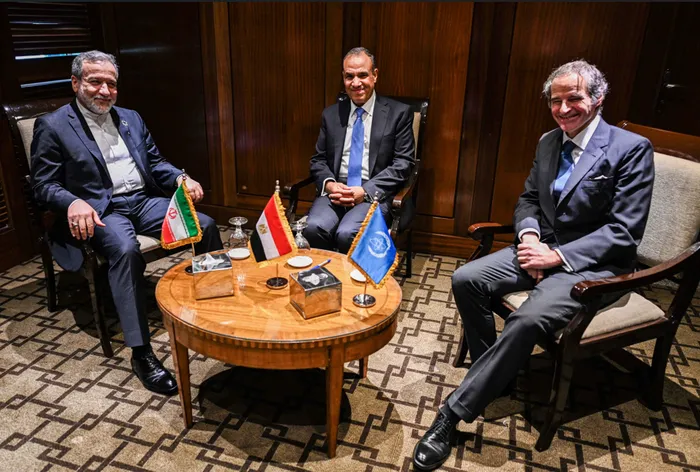Nuclear Negotiations and Western Hypocrisy

Egypt's Foreign Minister Badr Abdelatty (C) meets with his Iranian counterpart Abbas Araghchi (L) and Rafael Grossi, Director General of the International Atomic Energy Agency in Cairo on June 2, 2025. The UN nuclear watchdog's chief on June 2 called for more transparency from Iran after a leaked report from the agency showed Tehran had stepped up uranium enrichment.
Image: AFP
The nuclear standoff between Iran and the United States is often framed as a matter of international security, but rarely is it interrogated through the lens of fairness or consistency. At the heart of the matter lies a glaring double standard. Iran, a signatory of the Nuclear Non-Proliferation Treaty (NPT), is subject to strict inspections and legal obligations, while Israel–widely understood to possess a secret nuclear arsenal–faces no such scrutiny, having never signed the NPT. This contradiction is central to understanding why so many in the Global South view Western nuclear diplomacy not as a tool of peace, but as an instrument of geopolitical control.
The NPT was built on a bargain: non-nuclear states like Iran agreed to forgo nuclear weapons in exchange for the right to develop peaceful nuclear energy under international oversight. Iran has long maintained that its program is civilian in nature and has consistently allowed International Atomic Energy Agency (IAEA) inspections. Yet, it is treated as a rogue state, constantly threatened with sanctions and military action. Israel, by contrast, faces no pressure or inspections. The message is unmistakable: nuclear capabilities are acceptable for allies of the West, but intolerable for states that challenge US hegemony.
In 2015, the Joint Comprehensive Plan of Action (JCPOA) sought to resolve this impasse. Iran agreed to unprecedented constraints: uranium enrichment capped at 3.67%, a reduced number of legacy centrifuges, and a limited stockpile of low-enriched uranium. The deal extended Iran’s so-called “breakout time” – the period needed to amass enough fissile material for a bomb – to over a year. U.N. inspectors confirmed Iran’s compliance. In exchange, sanctions were to be lifted. But this fragile balance was destroyed in 2018 when President Donald Trump unilaterally withdrew from the agreement and reinstated economic sanctions, despite Iran’s adherence. Tehran initially continued to honor its commitments, hoping Europe would uphold its end. When that support failed to materialise, Iran began incrementally walking back its compliance.
Since then, Iran has increased its enrichment levels to 60%, dangerously close to weapons-grade – and installed more advanced centrifuges. Western analysts warn that Iran could now produce enough material for several bombs within weeks. Such developments heighten the risk of a regional arms race: Saudi Arabia has already indicated it would seek its own nuclear capability if Iran crosses that threshold. The absence of a monitoring framework also raises the danger of miscalculation. A perceived shift in Iran’s program could be interpreted by Israel – or even the US as a move toward weaponisation, triggering a devastating pre-emptive strike.
The US insists that it seeks a renewed deal, yet its approach suggests otherwise. It continues to impose maximum pressure while demanding Iranian concessions up front. Iranian leaders, understandably, see this as negotiating from a position of coercion rather than diplomacy. Supreme Leader Ayatollah Khamenei has dismissed US demands as “nonsense,” and Iran’s foreign ministry has repeatedly stated that the burden is on Washington to prove its sincerity. Having witnessed Trump’s abrupt withdrawal from the JCPOA, Iranian officials are reluctant to enter into another agreement without firm guarantees.
This skepticism is informed not just by recent history, but by the broader experience of nations in the Global South. South Africa dismantled its nuclear arsenal in 1990 as part of its own democratic transition, not under foreign pressure. Libya, however, gave up its program in 2003 under US and British persuasion – only to see its leader overthrown and the country plunged into chaos. Iran has learned from these precedents. As one Iranian analyst put it, the demand for Iran’s total nuclear disarmament, while ignoring the arsenals of US allies, reveals a “clear double standard.” This hypocrisy undermines the moral legitimacy of Western nuclear diplomacy and fuels deep mistrust.
If the United States is serious about non-proliferation and regional stability, it must abandon its one-sided approach. Iran’s right to peaceful nuclear energy is enshrined in the NPT, just as Israel’s continued opacity is a flagrant violation of international norms. Expecting Tehran to sacrifice its sovereignty without reciprocal action – such as verifiable sanctions relief and acknowledgment of its legal rights – is not diplomacy; it is domination.
The renewed talks represent a pivotal moment. A nuclear-armed Iran is not in anyone’s interest – not Iran’s, not the region’s, and certainly not the world’s. But avoiding that outcome requires more than threats and ultimatums. It requires genuine dialogue, mutual respect, and a willingness to acknowledge the structural inequalities in the global nuclear order. The question is not whether Iran should be restrained, but whether the rules apply equally to all.
Only a deal based on reciprocity and fairness can prevent escalation. Anything less risks triggering the very crisis the West claims to fear – and would further cement the perception, widely held in the Global South, that international law is just another tool of Western power. In the long run, peace will not come through pressure or war games, but through honest diplomacy that recognises every nation’s equal right to sovereignty, security, and dignity.
Written By:
By Chloe Maluleke
Associate at the BRICS+ Consulting Group
Russian & Middle Eastern Specialist
**The Views expressed do not necessarily reflect the views of Independent Media or IOL.
** MORE ARTICLES ON OUR WEBSITE https://bricscg.com/
** Follow @brics_daily on Twitter for daily BRICS+ updates